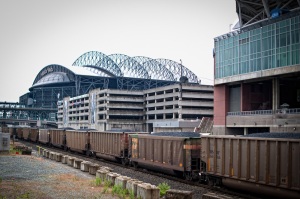Posts Tagged ‘terminals’
PNW coal export scoping to include GHG impacts in Asia
 The coal industry’s plan to move millions of tons of coal through Pacific Northwest terminals to China and other Asian markets took a serious hit when Washington regulators said environmental impact reviews must consider the worldwide impact of burning the export coal in China.
The coal industry’s plan to move millions of tons of coal through Pacific Northwest terminals to China and other Asian markets took a serious hit when Washington regulators said environmental impact reviews must consider the worldwide impact of burning the export coal in China.
A major battle surrounding the various export terminal proposals has centered on the “scope” of the environmental review process, such as whether the impact review would be limited to local port and terminal areas in the PNW region. Read the rest of this entry »
Coal export alliance plays jobs card for PNW
Say you’re watching Ed or Rachel for your daily dose of progressive news on MSNBC; they go to a commercial break and this 30-second ad pops up:
Just in time for the regulatory review and so-called scoping coal export proposal season here in the Northwest! It prompted me to take a look at the website that flashes briefly during the ad – the Alliance for Northwest Jobs & Exports.
One minor detail that gets brushed aside is that this is about selling cheap and dirty coal to international – mostly Asian – markets and hauling tens of millions of tons of it through heavily populated regions in the Pacific Northwest to new and/or upgraded export shipping terminals. Even the alliance’s name shuns the four-letter word. Jobs! Exports! Who can oppose that? Read the rest of this entry »
Seattle City Council: Thumbs down on PNW coal-export terminals
 Seattle’s City Council unanimously passed a resolution opposing the development of coal-export terminals in Washington State, but what does it really mean? Actually not much – it’s a victory, sort of, for environmental activists that are fighting proposals to transport coal on 1.5 mile-long trains through the region for eventual export to China.
Seattle’s City Council unanimously passed a resolution opposing the development of coal-export terminals in Washington State, but what does it really mean? Actually not much – it’s a victory, sort of, for environmental activists that are fighting proposals to transport coal on 1.5 mile-long trains through the region for eventual export to China.
But the city council has no real say on what happens with this issue; it was an easy vote for the council members. But it is a clear message from a city and port that prides itself on its greenness. (Regarding the Port of Seattle: the port’s opposition to a new sports arena in the SoDo district for NBA-starved fans because of “traffic” is both heartless, tone deaf, short-sighted and incredibly lame – but I digress.) Read the rest of this entry »
Tankers on shore power at Long Beach
 Slow change is better than no change: BP America and the Port of Long Beach Wednesday opened the world’s first oil tanker terminal equipped with shore power plugs.
Slow change is better than no change: BP America and the Port of Long Beach Wednesday opened the world’s first oil tanker terminal equipped with shore power plugs.
A major source of air pollution in port areas comes from the giant vessels that tie up at their docks to load and unload cargo. That’s because the powerful diesel engines have to run continuously to keep the ships’ equipment and support systems operating. That also means continuous spewing of ghg and diesel particulate emissions into the local air.
A solution to this massive emissions problem has long existed but is not widely implemented because of the expensive modifications required for on-ship and offshore facilities. It’s called shore power, which allows ships to shut down their diesel engines at berth and literally plug into the landside electricity grid, thus vastly improving air quality.
The BP terminal on Pier T is actually Long Beach’s second dock equipped with shore power, but it’s the first such facility in the world for “liquid bulk” ships — vessels that transport large amounts of petroleum and related fuels.
Reducing air pollution is a major component of the port’s Green Port Policy, adopted in 2005. Also this week Long Beach issued a call for ideas to implement a zero-emission container movement system.
The ports of Long Beach and Los Angeles, along with the Alameda Corridor Transportation Authority are seeking new technology to move cargo containers between docks and the Intermodal Container Transfer Facility near West Long Beach, potentially eliminating thousands of short-haul diesel truck trips each day and reducing air pollution.
Proposed technologies might include electric guideways, zero-emission trucks, or electrified rail, all of which use electricity to power the movement of cargo, rather than diesel-fueled trucks.
Shore power, also known as “cold-ironing,” allows a specially equipped vessel to plug in at berth. The vessel can then draw power for its pumps, communications, ventilation, lighting and other needs from Southern California Edison, instead of its own diesel engines.
Providing shore power to an off-loading oil tanker is the pollution-reducing equivalent of removing 187,000 cars from the road for a day. In a year, shore power will eliminate more than 30 tons of pollution.
BP’s shore power installation delivers enough electricity to power about 5,500 homes — up to 8 megawatts at 6,660 volts. The Alaska Tanker Company has equipped two vessels that regularly visit the port to be able to plug into the BP Terminal on Pier T, which supplies local refineries with crude oil. The joint project was completed at a cost of $23.7 million: $17.5 million from the port and $6.2 million from BP.
